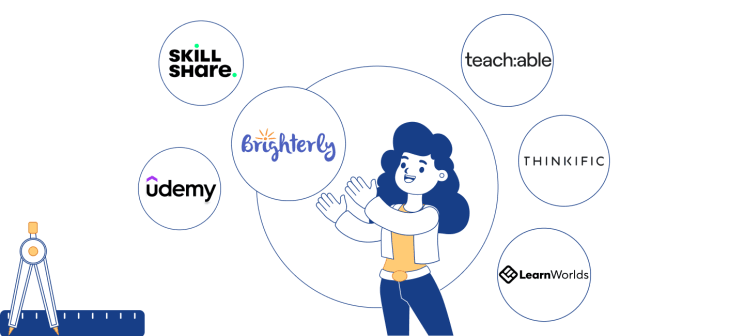For users, the best online course platforms match them with the courses that solve their problems. As for course creators, these platforms provide features and tools to host lessons, deliver on-demand classes, and market their offerings.
In this article, we compare online course platforms for both parties — those interested in finding the right course and those looking for the perfect online course platform to start teaching.
“My advice is to find the best online course platform that presents lots of shorter questions and then immediately tells you if you got the answer right or wrong,” says Jed Macosko, Professor at Wake Forest University and President at AcademicInfluence. Macosko also highlights the importance of the platform’s structure:
“If you are looking for a platform that will work well even when the students are more motivated to check a box that they have finished their assignments, then you will have to look hard.”
If you’re a course creator or teacher, you should also consider the learning curve of the platform, which is the time needed to figure out the platform’s tools for creating, delivering, and marketing courses.
Online tutoring platforms are a good place to start as they are easy to use and require minimal marketing from your side. You’ll also get instant feedback from students, which will help you understand what’s working and what’s not.
Jaime Smith, founder and CEO of OnlineG3, an education company for gifted and 2E students, has useful tips on how to use complex platforms in the easiest possible way:
“At OnlineG3, we have been using Moodle as our course management system for the last 15 years.”
Factors for choosing an online course platform
From the users’ perspective, here are some factors that help them choose an online platform:
- What do I want to achieve?
- How is the course taught?
- Who are the instructors?
- What’s the level of the course?
- Is the platform user-friendly?
- What are the rates?
What do I want to achieve?
You may want to advance your career, help your child with math, or earn a certification. Once you’ve defined your learning objectives, it will be easier to narrow down the types of online course platforms that best meet your needs.
How is the course taught?
Is the course self-paced or does it include live lessons with an instructor? If you need flexibility, you may want to go with courses that offer on-demand videos. If you need quick results, you may want to consider a live online class platform to get instructors’ feedback.
Who are the instructors?
Double-check if the instructors are experienced and qualified in their fields. On most platforms, you can read reviews and check ratings before you sign up.
What’s the level of the course?
You don’t want to enroll and start a course only to find out that it’s too advanced for you. Make sure to read the course description very well, so you avoid any disappointments. The course description will also give you information on the teaching material, be it video, text, or live lesson, and let you know if there are any prerequisites to join.
Is the platform user-friendly?
If you’re looking for online courses, chances are, you want to access the course on different devices or from the comfort of your home. Ensure the platform allows this, so your learning doesn’t get interrupted.
What are the rates?
The most popular course websites require a financial investment, whether that’s a one-time fee or a monthly subscription. Choose a platform within your budget and understand the commitment before signing up. Many platforms offer a free trial or a demo so you can make a more educated decision.
Which online course platform is best?
The best online course platform depends on the learners’ and instructors’ needs. In this article, we’ll talk about Brighterly, Udemy, Skillshare, Coursera, and Khan Academy for users.
We chose tutoring platforms, course marketplaces, and free options to represent learners’ different needs. For example, users who want instant feedback will find online tutoring platforms the most effective. Alternatively, for users who would like to browse through a wide range of courses, online course marketplaces would be a better choice.
For instructors, we’ll compare Brighterly, LearnWorlds, Thinkific, Teachable, and Moodle, as course creators also have different needs. For example, a schoolteacher may want to explore online teaching as an option, while an entrepreneur might want to educate their audience on how to use their services better.
The best platforms for online courses for users
The best platforms for online courses for users are:
- Brighterly – best for math tutoring service
- Udemy – great as a course marketplace
- Skillshare – for creative skills
- Coursera – for university-level courses
- Khan Academy – as a free option.
Online Course Platform # 1: Brighterly: Best for families
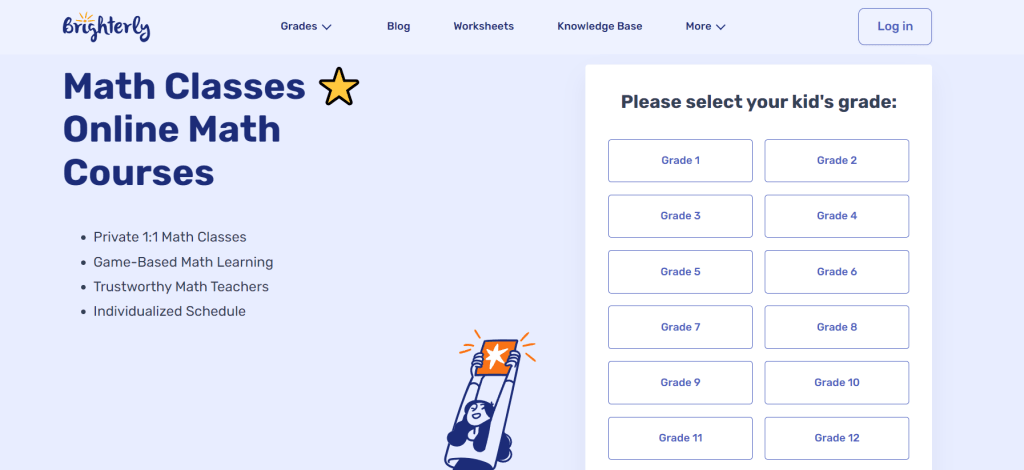
Look no further than Brighterly as the best platform for online courses in Grade 1 to Grade 12 math. As an online class platform, Brighterly specializes in math and only math, so you’re sure to work with experts instead of generalists.
The experts you’ll meet at Brighterly are specialized math tutors. Once you’ve completed a free demo, the Brighterly team will have a better idea of your child’s math needs. Then, they will match you with a tutor, who will give 1:1, interactive lessons. All courses are personalized, depending on your child’s needs. For example, Grade 1 students may focus on game-based learning that will help them build solid math foundations, and Grade 12 students will cover school subjects to prepare for the SATs.
Brighterly’s reviews mention the friendliness of tutors and the instant improvement in students’ math grades. “The ability to screen share with the kids made it easier to instantly correct their errors as they went along,” said a parent when describing smooth communication between tutors and children on the platform.
Pricing depends on the bundle you buy. The introduction package costs $36 per lesson, including 7 math classes you can take based on your schedule, class notes, two learning progress reports, and live customer support. The more classes you get, the better benefits you have. For example, with the Math Skills Bundle, you’ll get 16 classes, three learning progress reports, lesson recordings, and a learning certificate, along with a cheaper per-lesson rate.
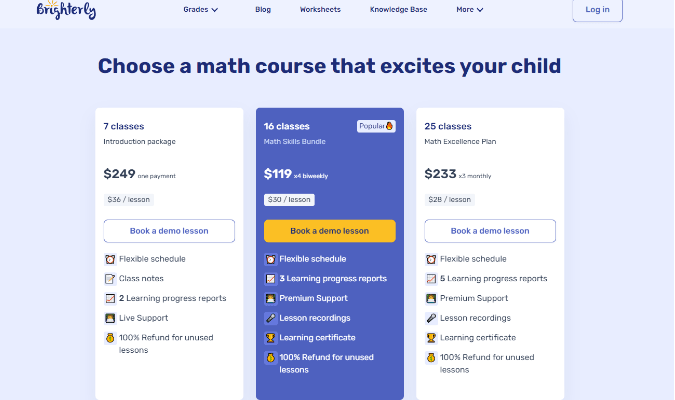
Brighterly Pros:
- Personalized math learning with expert tutors
- 1:1 interaction with tutors so you can ask questions and interact
- Flexible course packages with extra benefits, including live support, learning reports, lesson recordings, and a 100% refund for unused lessons
Brighterly Cons:
- Not free
- Only for students between Grade 1 and Grade 12
Online Course Platform # 2: Udemy: Best for a course 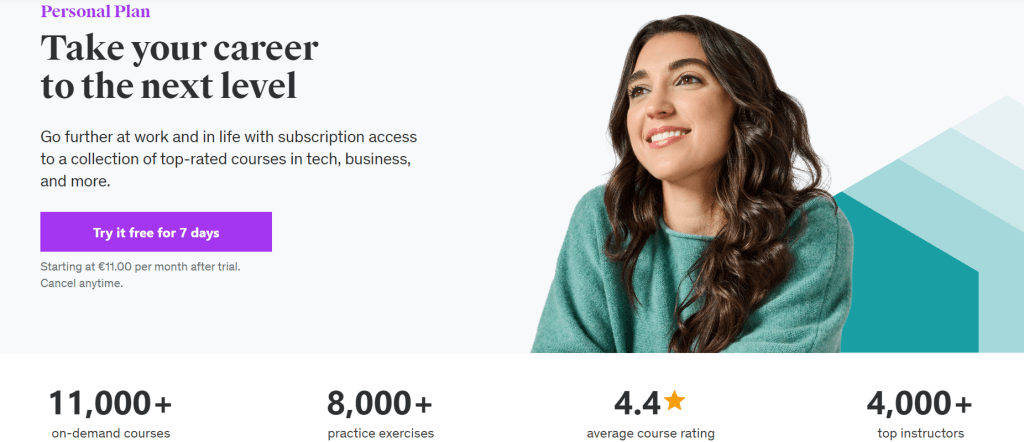
Udemy is an online course platform and marketplace where you can find thousands of courses covering a wide range of topics, from web development to business management.
Instructors create their courses and publish them on the platform, so students can purchase them and study in their own time. As a learner, you will have complete freedom on what you want to study and how you want to get started. For example, if you’re a complete beginner at programming, you may want to start with a beginner-level course in the field. Then, you can check if the same instructor has other courses for more advanced students, or look for a completely new instructor.
Each course has its own price on Udemy, but the platform regularly hosts sales. If you’re planning to use it regularly, you may benefit from a Personal Plan that costs $12.99 per month, which will give you access to over 11,000 top-rated on-demand courses. The plan comes with a 7-day free trial.
Udemy Pros
- A wide range of courses to choose from, both for children and adults
- Good for career development
- Free trial available
Udemy Cons
- Not free
- No live instructor feedback
Online Course Platform # 3: Skillshare: Best for creative skills
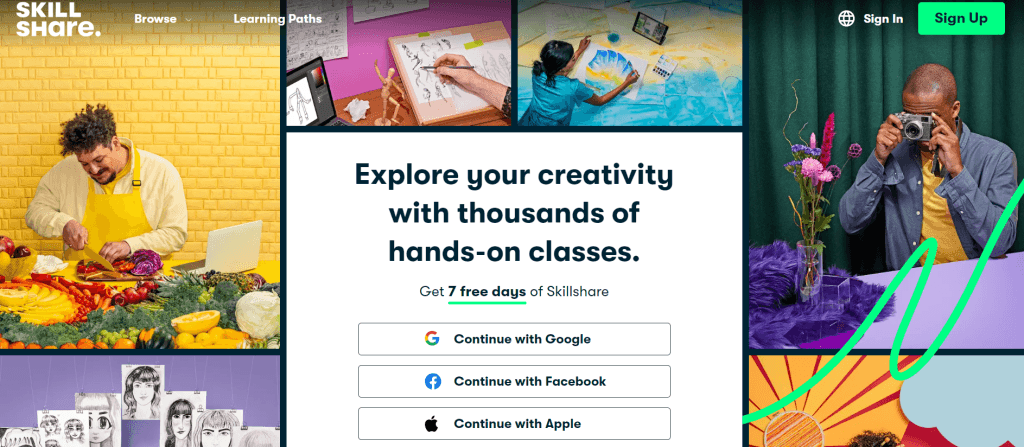
With over 25,000 classes and 8,000 teachers, Skillshare is one of the most popular course websites for developing creative skills such as painting, design, photography, social media, and creative writing.
Before you sign up, you can check the courses’ introduction pages to see the course’s level, any prerequisites you need, and the learning outcomes. In 2023, Skillshare also introduced Live Sessions, a digital event series for students to interact with course creators.
To access the courses after a 7-day free trial, you’ll need to pay for a Skillshare membership. Prices depend on the country you’re in, but average at around $14 per month for individuals.
Skillshare Pros
- Includes a 7-day free trial
- Good for creative skills such as art, design, photography, and writing
- Flexible learning, which means you can study in your own time
Skillshare Cons
- Doesn’t include other courses apart from creative topics
- Limited live events
Online Course Platform # 4: Coursera: Best for university-level certificates
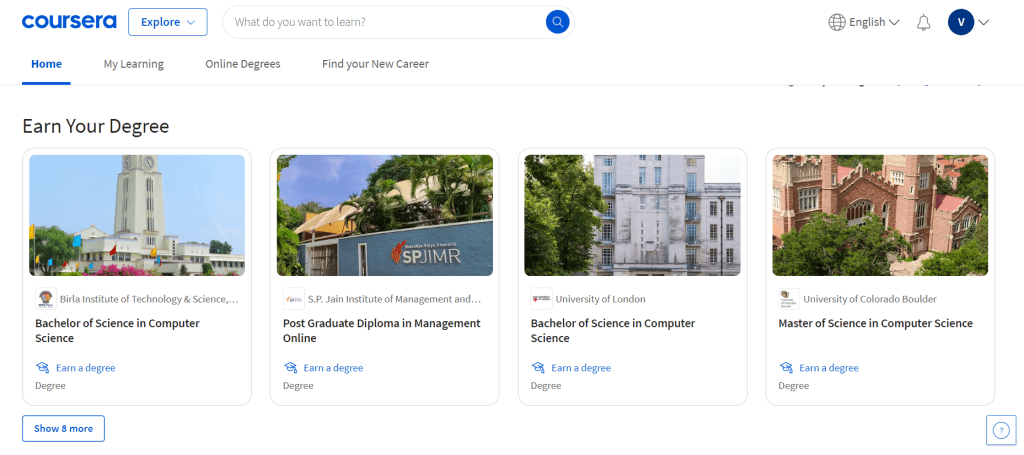
Also an online classes platform and marketplace, Coursera partners with world-class universities and industry-leading companies.
Learners can opt for free courses, certificate programs, or online degrees, all delivered by qualified instructors. Once you’ve created an account, you’ll get to set career goals and experience levels. The platform will then be able to match you with interesting courses. For example, if you’re a teaching professional looking to make money online, you’ll likely be matched with some business development courses. Depending on the course, you’ll receive different teaching resources and assignments, which could be on-demand videos, quizzes, and worksheets.
